Peanut butter’s cool and all, but sometimes you just need to shake things up.
Or maybe you’re hanging out with that friend who can’t even look at a peanut without feeling queasy. We’ve got you covered.
Diving into the kitchen doesn’t have to mean sticking to the usual suspects.
In fact, it’s game time for your pantry staples to step up and take the spotlight. Almond butter? Sure, it’s a classic swap. But why stop there?
We’re talking cashew spreads that’ll make you forget peanuts were ever a thing.
Seed butters that’ll make your toast do a happy dance.
And hey, if you’re feeling extra daring, there’s even stuff out there made from sunflowers.
Each of these substitutes has its own unique vibe, texture, and taste benefit that brings something new to the table.
Ready to make your sandwiches and recipes exciting again?
What is Peanut Butter?

Peanut butter is a food paste or spread made from ground dry roasted peanuts.
It often contains additional ingredients that modify the taste or texture, such as salt, sweeteners, or emulsifiers.
Peanut butter is popular in many countries and is used as a sandwich filling (commonly with jam ), an ingredient in various breakfast dishes, or simply as a snack.
Natural peanut butter contains only peanuts and salt.
In the United States, peanut butter is usually classified as a “jelly sandwiches” and “candy” food type.
The texture of peanut butter varies depending on the amount of grinding and the type of peanuts used.
It can be smooth or chunky, dry or oily, and have different salty, sweet, or savory flavors.
Regarding flavor, American-style peanut butter is generally sweeter than its European counterpart.
The taste of peanut butter is described as nutty and rich.
Peanut butter is a food that can be eaten on its own or used as an ingredient in other dishes.
When used as an ingredient, it can add a nutty flavor to recipes.
If you’re looking for a more savory peanut butter flavor, look for roasted peanuts brands.
If you want sweeter-tasting peanut butter, look for brands that add sugar or honey.
The 5 Best Substitutes for Peanut Butter
Peanut butter is a popular spread loved by many, but if you are looking for alternatives due to allergies, taste preferences, or dietary restrictions, there are several options to consider.
In this guide, we will compare the top 5 substitutes for peanut butter, discussing their key characteristics and suggesting proper ratios to help you find suitable alternatives.
| Substitute | Key Characteristics | Proper Ratio |
|---|---|---|
| Almond Butter | Creamy and nutty flavor; slightly sweeter than peanut butter | Use an equal amount of almond butter as a substitute for peanut butter |
| Sunflower Seed Butter | Nut-free alternative; mild taste; spreads easily | Use an equal amount of sunflower seed butter as a substitute for peanut butter |
| Cashew Butter | Creamy texture; subtly sweet and buttery flavor | Use an equal amount of cashew butter as a substitute for peanut butter |
| Walnut Butter | Rich and earthy flavor; slightly bitter notes | Use an equal amount of walnut butter as a substitute for peanut butter |
| Hazelnut Butter | Nutty and rich flavor; slightly sweeter than peanut butter | Use an equal amount of hazelnut butter as a substitute for peanut butter |
Now, let’s dive into each substitute in more detail:
1. Almond Butter
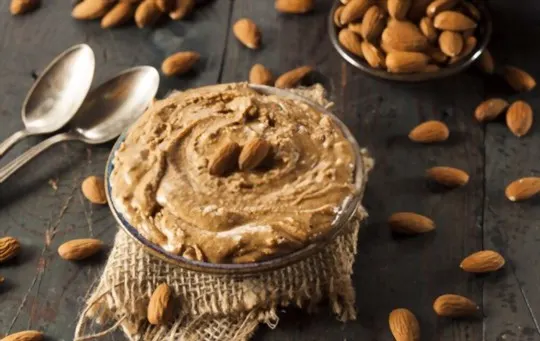
Most people are familiar with peanut butter, but almond butter is a lesser-known spread that is just as delicious and nutritious.
This smooth paste comprises ground almonds and has a distinctive nutty flavor.
It has a delicious, rich flavor that is hard to resist.
Almond butter, unlike its competitors, has a mild and nutty taste that works well with toast or in smoothies.
It also offers a pleasant texture and mouthfeel.
In addition to being a great source of protein and healthy fats, almond butter is also rich in vitamins and minerals, making it a health-conscious choice for breakfast or a snack.
There are many ways to enjoy almond butter, including spreading it on toast or adding it to smoothies.
You can also use it as a baking ingredient or topping for oatmeal or pancakes.
Almond butter is a great substitute for peanut butter because it has a similar consistency and can be used in the same way.
However, almond butter is more expensive than peanut butter, so you may want to consider this when deciding.
- Key Characteristics: Almond butter offers a creamy texture and a nutty flavor. It is slightly sweeter than peanut butter and works well as a substitute.
- Proper Ratio: Use an equal amount of almond butter as a substitute for peanut butter. Adjust the sweetness level based on personal preference.
2. Sunflower Seed Butter (Nut-free)
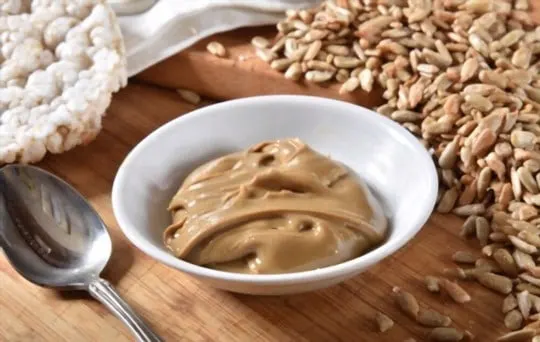
Sunflower seed butter is a delicious, nut-free alternative to peanut butter.
It’s perfect for those with nut allergies, and it’s also a great option for those looking for a healthier spread.
Sunflower seed butter is made from, you guessed it, sunflower seeds.
The seeds are roasted, ground into a smooth paste, and then sweetened with sugar or honey.
Sunflower seed butter has a slightly sweeter taste than peanut butter, and it’s also lower in fat and calories.
Plus, it’s packed with vitamins and minerals like vitamin E, magnesium, and phosphorus.
When substituting sunflower seed butter for peanut butter, keep in mind that it may not be as thick or creamy.
To get the desired consistency, you may need to add a little more sunflower seed butter to your recipe.
But overall, sunflower seed butter is a delicious and healthy alternative to peanut butter.
- Key Characteristics: Sunflower seed butter is a nut-free alternative to peanut butter. It has a mild taste, spreads easily, and is a popular choice for individuals with allergies.
- Proper Ratio: Use an equal amount of sunflower seed butter as a substitute for peanut butter. Enjoy the same texture without the presence of nuts.
3. Cashew Butter
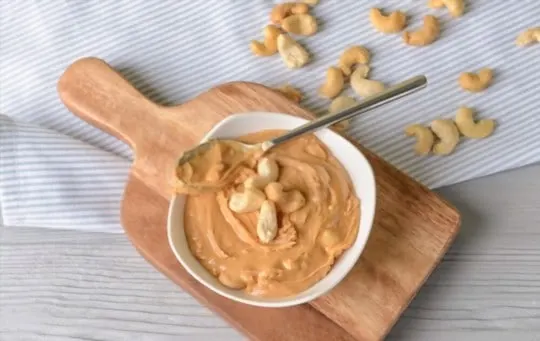
Cashew butter is a type of nut butter made from roasted cashews.
It has a creamy texture and a slightly sweet, nutty flavor.
Cashew butter is a good source of healthy fats, protein, and essential vitamins and minerals.
It can be used in place of other nut butter in recipes or as a spread on toast or crackers.
Cashew butter is also a popular ingredient in vegan and Paleo-friendly dishes.
While it is relatively high in fat, cashew butter is cholesterol-free and can be part of a healthy diet when consumed in moderation.
Cashew butter can be found in most grocery stores or made at home using a food processor or high-speed blender.
When choosing a store-bought variety, look for roasted cashews brands and do not add any additional oils or sweeteners.
- Key Characteristics: Cashew butter has a creamy texture and a subtly sweet, buttery flavor. It offers a smooth consistency and can be used as an alternative to peanut butter.
- Proper Ratio: Use an equal amount of cashew butter as a substitute for peanut butter. Adjust other ingredients based on the desired flavor profile.
4. Walnut Butter
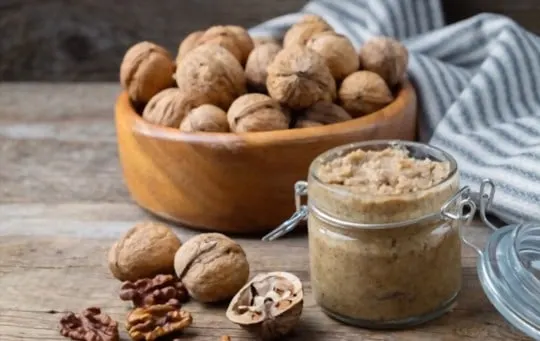
There are few things more satisfying than a spoonful of nut butter straight from the jar.
And while peanut butter will always have a special place in our hearts, we think it’s time to give walnut butter a try.
Trust us, this delicious spread is worth seeking out.
Unlike peanut butter, which can be heavy and cloying, walnut butter is light and slightly sweet.
It’s also packed with heart-healthy fats and antioxidants.
Spread it on toast, add it to smoothies, or eat it by the spoonful—we won’t judge.
In terms of taste, walnut butter is slightly sweeter than peanut butter and has a more complex flavor.
It’s also thinner inconsistency, which makes it ideal for baking.
- Key Characteristics: Walnut butter provides a rich and earthy flavor with slightly bitter notes. It can be used as a unique alternative to peanut butter for those seeking a different taste experience.
- Proper Ratio: Use an equal amount of walnut butter as a substitute for peanut butter. Consider the slightly bitter taste and adjust other flavors accordingly.
5. Hazelnut Butter
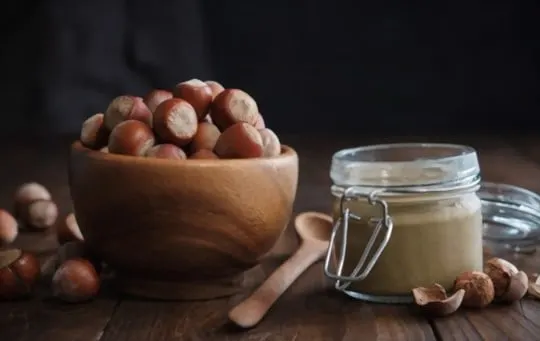
Hazelnut butter is a delicious and healthy alternative to other nut butter.
Unlike peanut or almond butter, hazelnut butter is relatively low in saturated fat and high in polyunsaturated fat.
This makes it a healthier option for those looking to improve their diet.
In addition, hazelnut butter contains many vitamins and minerals, including magnesium, potassium, and zinc.
It also contains antioxidants, which can help to protect cells from damage.
Hazelnut butter is versatile and can be used in a variety of recipes.
It can be spread on toast or used as a dip for fruit and vegetables.
It can also be added to smoothies or used as a baking ingredient.
Hazelnut butter is smoother and creamier than peanut butter, so it may take some time to get used to the texture.
However, once you do, you’ll be hooked.
This butter is also sweeter than peanut butter, perfect for those with a sweet tooth.
- Key Characteristics: Hazelnut butter offers a nutty and rich flavor, slightly sweeter than peanut butter. It is commonly used in spreads and desserts.
- Proper Ratio: Use an equal amount of hazelnut butter as a substitute for peanut butter. Adjust sweetness levels based on personal preference.
Conclusion
If you’re looking for a peanut butter substitute, there are plenty of options.
Almond butter, cashew butter, sunflower seed butter, and hazelnut butter are good alternatives.
Each has its unique flavor and texture, so you’ll need to experiment to find the one that you like best.
Like peanut butter, you can find these substitutes in both creamy and chunky versions.
You can also find flavored versions of these butter, such as chocolate almond butter or honey cashew butter.
So if you have a peanut allergy or just looking for something different, don’t be afraid to try one of these delicious alternatives.
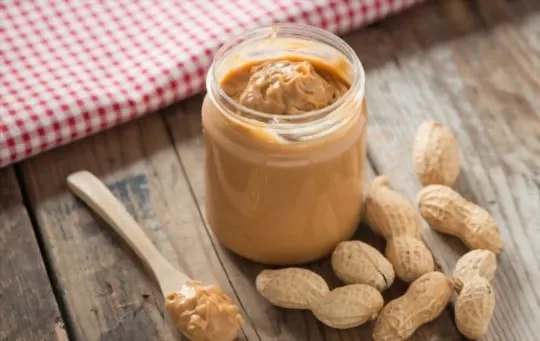
The 5 Best Substitutes for Peanut Butter
Ingredients
- Almond Butter
- Sunflower Seed Butter Nut-free
- Cashew Butter
- Walnut Butter
- Hazelnut Butter
Instructions
- Pick your favorite substitute from the list above.
- Follow cooking directions for your selected substitute with the proper ratio of ingredients.

Andrew Gray is a seasoned food writer and blogger with a wealth of experience in the restaurant and catering industries. With a passion for all things delicious, Andrew has honed his culinary expertise through his work as a personal chef and caterer.
His love for food led him to venture into food writing, where he has contributed to various online publications, sharing his knowledge and insights on the culinary world. As the proud owner of AmericasRestaurant.com, Andrew covers a wide range of topics, including recipes, restaurant reviews, product recommendations, and culinary tips.
Through his website, he aims to inspire and educate fellow food enthusiasts, offering a comprehensive resource for all things food-related.

Leave a comment